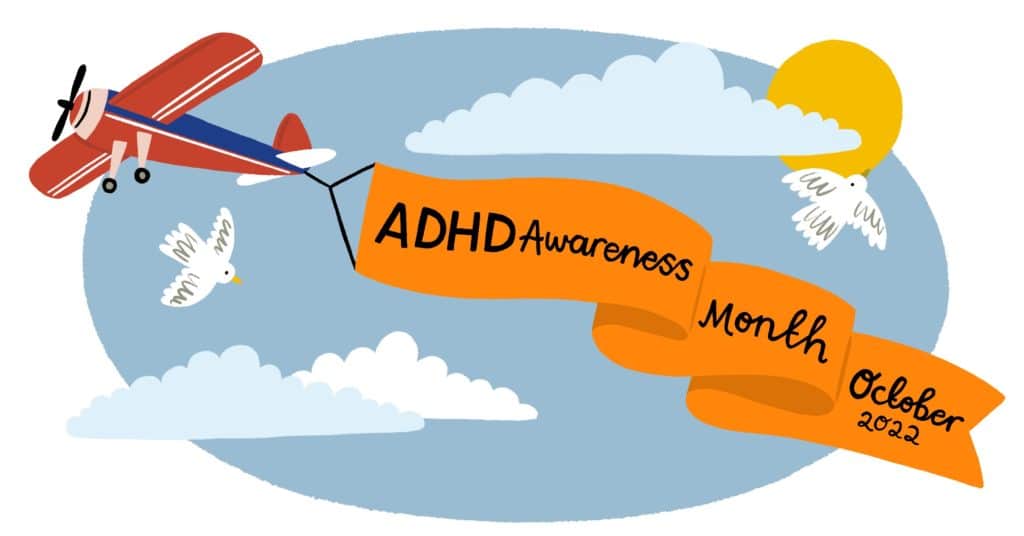
By Kaitlyn Pfiester
Clinically reviewed by Dr. Gayle Jensen-Savoie
October is National ADHD Awareness Month. Whether you have ADHD, think you may have it, or know someone who does, it’s a good idea to expand your knowledge to provide or seek support. ADHD symptoms can show differently in different people, which can be challenging to diagnose.
So, in the spirit of raising awareness, let’s talk about ADHD, what it looks like, and discover a bit about the history behind the condition.
Key Things To Know About ADHD
How many people are diagnosed with ADHD?
According to the Centers for Disease Control and Prevention, about six million children (ages 2-17) were diagnosed with ADHD between 2016 and 2019.
Adults are being diagnosed at a rate four times higher than the rate for children. A 2019 study published in the open access journal JAMA Network Open found that the “overall rate of annual adult ADHD incidence per 10,000 person-years increased from 9.43 in 2007 to 13.49 in 2016.
This study suggests that the rising rate could be due to increased knowledge and awareness of ADHD, among the public and medical providers.
How Gender Affects ADHD
ADHD can affect anyone, regardless of gender. Historically, boys have been diagnosed with the condition much more often than girls. A February 2022 study published in the CDC’s Morbidity and Mortality Weekly Report found that, from 2013 through 2019, “boys had approximately double the prevalence of ADHD diagnoses compared with girls.”
But many experts believe ADHD is likely under-diagnosed in girls. Girls are more likely to have predominantly inattentive ADHD — with symptoms like frequent daydreaming, not paying attention, anxiety and low self-esteem. Parents, teachers and even medical providers often don’t notice those symptoms like they notice the more disruptive ADHD symptom often found in boys.
This underdiagnosis has affected thousands of girls and women. But as people become more aware of the aware of the disparities, experts hope more girls will be diagnosed at a younger age, and will get treatment.
The History of ADHD and ADHD Awareness Month
ADHD has been around for as long as any other mental health condition, but it has only been known by that name for the past 35 years or so. One of the first times in history we saw symptoms of ADHD described was by Hippocrates around 493 BC.
A Sydenham Society article published in 1849 described how Hippocrates made note of people who had “… quickened responses to sensory experience, but also less tenaciousness because the soul moves on quickly to the next impression.” While we don’t know if these individuals had ADHD for sure, we know that people have been showing symptoms for centuries.
In more modern times, ADHD underwent a few name changes before finally, in 1987, the American Psychiatric Association coined the term Attention Deficit Hyperactivity Disorder or ADHD.
While ADHD as a diagnosis was still fairly new, several organizations — including the non-profit Children and Adults with Attention-Deficit/Hyperactivity Disorder, or CHADD, the ADHD Coaches Organization, and ADDitude magazine — began raising awareness around the issue.
Awareness for ADHD caught on quickly, and on September 7th, 2004, the United States Senate approved a resolution establishing that day as ADHD Awareness Day.
This was a true win for the organizations involved, along with many people with undiagnosed ADHD — who didn’t know their struggle to focus had nothing to do with laziness or irresponsibility.
Now, what started as that day in September has grown into an entire month — every October — of awareness building.
Resources for ADHD
Even with increased awareness about ADHD, some parts of society still don’t understand the condition and can attach a stigma to it. The modern workplace can also make it difficult for people with ADHD to cope.
Many with ADHD feel lonely and misunderstood. The website ADHDawarenessmonth.org provides a space where people can share their stories
through memes, art, or even video.
CHADD also offers events and learning materials to help people understand the condition.
ADHD Online is also offering a range of resources in October to help people better understand ADHD.
- Check out our webpage detailing our “31 days of ADHD” podcasts. Our “Refocused” podcast is ratcheting up in honor of ADHD Awareness Month, with 31 podcasts over 31 days. We’ll be talking to a wide range of people, who share their experiences understanding, learning about and living with ADHD.
- You can also sign up for our newsletter on the page, and learn more about other resources we offer.
- You can also check out and download the free webinars — live and recorded — we offer that cover issues critical to the ADHD community.
Sources:
ADD.org: Where Did ADHD Awareness Month Get Its Start?
CDC: Mental Health Surveillance Among Children — United States, 2013–2019
The Sydenham Society: Aphorisms In The Genuine Works of Hippocrates






